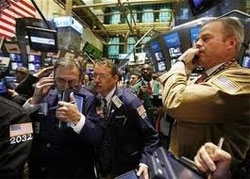European stocks slip amid simmering Libya tensions
 |
| illustration photo |
London's FTSE 100 index of top shares sank 0.29 per cent to 6,065.54 points, Frankfurt's DAX 30 slid 0.71 per cent to 7,374.25 points and the Paris CAC 40 dipped 0.71 per cent to 4,127.82.
The Stoxx 50 index of leading eurozone companies was off 0.95 per cent to 3,038.75 points approaching the mid-way stage.
In commodities, meanwhile, worsening violence in Libya helped send oil prices to two-year peaks above $105 per barrel as concern intensified over spreading unrest in the Middle East and North Africa region.
Human Rights Watch said on Monday that at least 233 people have been killed since Thursday in a crackdown in Libya on protests inspired by the uprisings in its neighbours Egypt and Tunisia.
"Now that many in the Middle East have tasted change after the people of Tunisian and Egyptian have achieved the ousting of their leaders, the appetite has grown bigger within other states," said Capital Spreads boss Simon Denham.
"The Libyan problems could continue for days as well but in this instance the population are dealing with the longest standing ruler within the area who simply is not going to give up without a fight."
At the same time, he said European markets "have been lifted by good economic data from Germany and Europe."
Eurozone manufacturing and service activity in February hit levels last seen in July 2006 but inflation, an increasing concern, also jumped sharply, a closely watched survey showed on Monday.
The Eurozone composite output index compiled by the Markit research firm rose 1.4 points from January to 58.4 points in February.
It said the latest reading "signalled the strongest monthly expansion since July 2006 and one of the strongest growth rates in the near 13-year history of the survey."
Service business activity alone rose to 57.2 points from 55.9 points in January, with manufacturing output at 61.1 points, up from 59.4 points for a 10-month high, Markit said in a statement.
The eurozone manufacturing sector purchasing managers index, a forward looking measure, hit 59 points, its highest since June 2000, up from from 57.3 points. A reading above 50 indicates activity is expanding.
Meanwhile in Germany, Europe's biggest economy, business confidence hit a third straight record high in February, the Ifo institute said.
In February, Ifo's measure of business sector confidence hit a record 111.2 points, demonstrating that "the upswing in the German economy is robust," president Hans-Werner Sinn said in a statement.
It was the index's ninth consecutive rise and Ifo's business expectations index for the coming six months also set a record at 107.9 points.
The record showing resulted from a strong increase in companies' assessment of their current conditions.
Markets also absorbed fast-moving merger and acquisition activity, with British-based brewer Diageo expanding in Turkey, while energy major Royal Dutch Shell agreed to sell most of its downstream assets in Africa.
British energy giant BP meanwhile announced a massive tie-up worth up to $20 billion with India's Reliance.
In foreign exchange deals, meanwhile, the European single currency dipped against the dollar as the foreign exchange market gives a muted response to the outcome of weekend G20 talks in Paris, dealers said.
The euro slid to $1.3669 dollars $1.3691 in New York late Friday.
What the stars mean:
★ Poor ★ ★ Promising ★★★ Good ★★★★ Very good ★★★★★ Exceptional
 Tag:
Tag:
Related Contents
Latest News
More News
- Cashless payments hit 28 times GDP in 2025 (February 04, 2026 | 18:09)
- SSIAM and DBJ launch Japan Vietnam Capital Fund (February 04, 2026 | 15:57)
- Banks target stronger profits, credit growth in 2026 (February 04, 2026 | 15:43)
- Vietnam on path to investment-grade rating (February 03, 2026 | 13:07)
- Consumer finance sector posts sharp profit growth (February 03, 2026 | 13:05)
- Insurance market building the next chapter of protection (February 02, 2026 | 11:16)
- NAB Innovation Centre underscores Vietnam’s appeal for tech investment (January 30, 2026 | 11:16)
- Vietnam strengthens public debt management with World Bank and IMF (January 30, 2026 | 11:00)
- Corporate bond market poised for stronger growth cycle (January 28, 2026 | 17:13)
- Vietnam's IPO market on recovery trajectory (January 28, 2026 | 17:04)






















 Mobile Version
Mobile Version